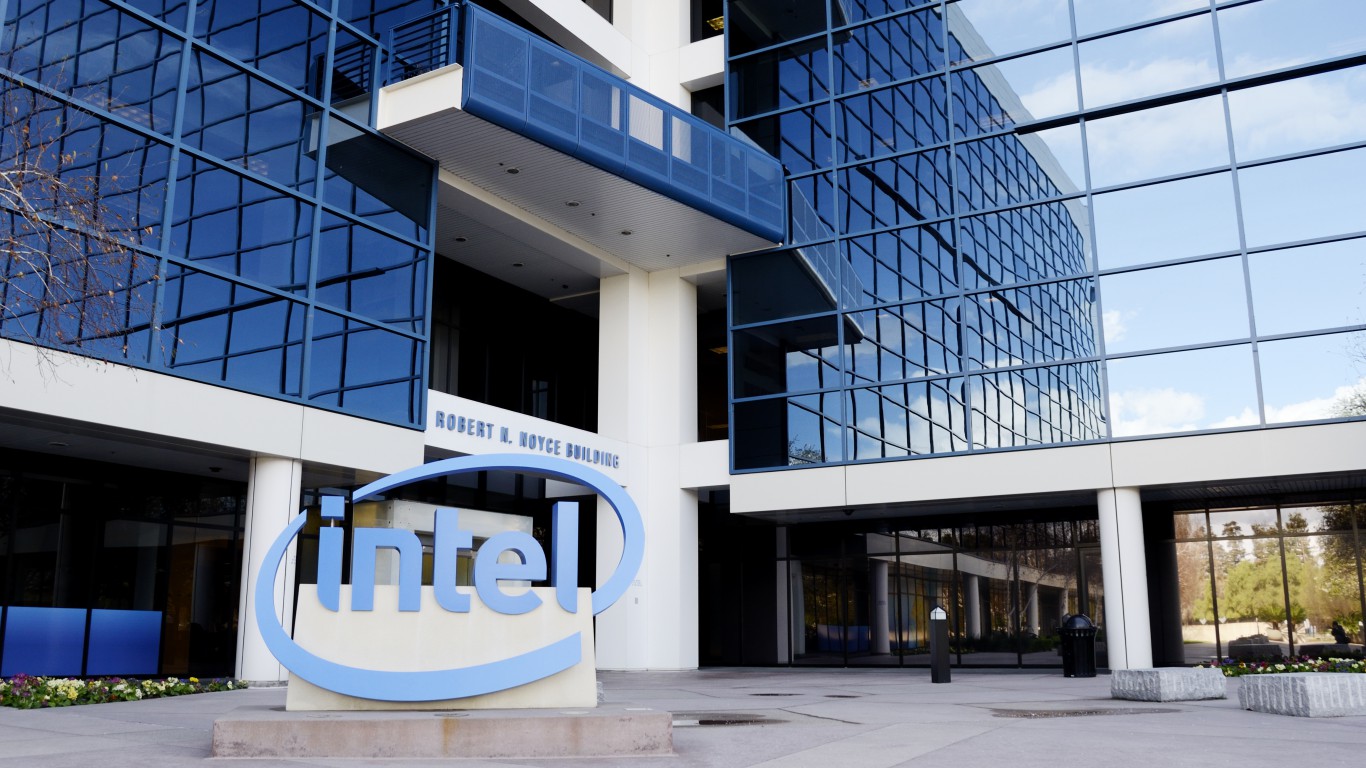

Six of the 10 largest U.S. publicly traded companies by market cap are technology companies. So far in 2018, the tech sector is the only one to have posted a double digit gain.
The four largest tech companies — Apple, Amazon, Microsoft, and Alphabet — are in a race to be the first to reach a $1 trillion valuation. Apple, with a market cap of nearly $950 billion, is well ahead of the others and is a clear favorite to be the first to reach the magic number.
The following list of the 12 companies that dominate the tech sector are just about evenly divided between hardware and software companies. If one counts Apple as a hardware company and IBM as a software company, then the list is evenly split.
Another interesting observation about the 12 companies on the list is many were the first to create and launch a product that gained and held traction in the market. Those products generated much of these companies’ wealth and later revenue growth.
Apple, for example, released the first graphical operating system on its Macintosh computers back in 1983. It took Microsoft years to catch up, but once it did the Mac became a niche computer. Apple’s iPhone, first introduced in 2007, took a couple of years to reach it’s now dominant market position. The iPhone took 86% of second-quarter profits on global iPhone sales.
Amazon may not have been the first e-commerce website, but it was almost certainly the biggest right out of the gate. Microsoft’s operating system for personal computers was not first, nor was Google’s search engine, but both simply wiped out any competitors.
In the hardware sector, Intel teamed with Microsoft and IBM to make its chips the standard for personal computing. As demand grew for more powerful processors for servers, Intel had a head start. Cisco was not the first networking hardware company (remember Novell and 3Com and a host of others), but it quickly became an industry standard after its products first appeared in the mid-1980s.
Oracle was included among the first of the enterprise database companies, and like Intel and Cisco, it was able to establish itself as a standard. Nvidia, Texas Instruments, and Broadcom all make semiconductors for specialized computing functions, while IBM (mostly) has transitioned itself out of the hardware business. The 108 year-old company moved the software and services business where it competes with “upstarts” like Oracle and others.
These tech giants are also looking ahead to applications using machine learning, artificial intelligence, virtual and augmented reality, and blockchain. Such applications, from self-driving cars to games, to surgical aids, are still mostly under development and many are still years away from being ready for the mass market.
There is no guarantee that any of these companies will continue to dominate their market, but with deep pockets and astute investments, they do not have to build everything themselves — they can buy it. Some of the larger companies on this list may even take a look at buying some of the smaller ones on the list. That has been the Darwinian tale of the tech sector in the last 30 or so years, and that is not likely to change.
24/7 Wall St. ranked our list tech titans by market cap as of May 25, 2018. Included are the companies’ most recent fiscal year revenues, net income, shares outstanding, and number of employees.
Click here to see the 12 American Companies that Control Tech.

1. Apple Inc. (NASDAQ: AAPL)
>Market Cap: $947.59 billion
>Revenue: $229.23 billion [fiscal year ends in September]
>Net Income: $48.35 billion
>Shares outstanding: 5.134 billion
>Employees: approximately 123,000
Apple is not only the most valuable U.S. company, but also the world’s. Although Apple’s share of the smartphone market trails Samsung’s, the company’s share of global revenues from smartphone sales reached 51% of total 2017 sales of $120.2 billion, or $61.4 billion. The company announced in early May a share buyback of $100 billion, which should further lift its stock price. For the current fiscal year, analysts forecast revenue of $261.22 billion and have a 12-month consensus price target on the stock of $195.31 — which would be enough to make Apple the world’s first publicly traded $1 trillion company.
[in-text-ad]

2. Amazon.com Inc. (NASDAQ: AMZN)
>Market Cap: $777.85 billion
>Revenue: $177.87 billion [December]
>Net Income: $3.03 billion
>Shares outstanding: 484.11 million
>Employees: approximately 566,000
To say that Amazon has disrupted the retail sector is, perhaps, barely adequate. With its twin focuses on growth and customer service, the company has turned the brick-and-mortar retail sector inside out. But Amazon is more than shopping. Its Echo devices have captured more than 80% of the market for voice-controlled devices, and Amazon Web Services posted 2017 revenue of $17.5 billion. For the current fiscal year, analysts forecast revenue of $236.96 billion and have a 12-month consensus price target on the stock of $1,820.20.

3. Alphabet Inc. (NASDAQ: GOOGL)
>Market Cap: $755.33 billion
>Revenue: $110.86 billion [December]
>Net Income: $12.66 billion
>Shares outstanding: 298.49 million
>Employees: 80,110
The parent company of the world’s dominant search engine also owns YouTube, arguably the world’s leading online streaming video platform. The company rakes in about 36% of all U.S. online ad spending. The company said in April that its total purchases of renewable energy exceeded the amount of electricity used by all of its operations around the world. For the current fiscal year, analysts forecast revenue of $136.16 billion and have a 12-month consensus price target on the stock of $1,254.30.
4. Microsoft Corp. (NASDAQ: MSFT)
>Market Cap: $751.73 billion
>Revenue: $89.95 [June]
>Net Income: $21.2 billion
>Shares outstanding: 7.7 billion
>Employees: approximately 124,000
Microsoft is locked in a battle with Amazon and IBM to be the top provider of commercial enterprise cloud services. In the March quarter Microsoft beat both companies, posting revenues of $6 billion and a preposterous 93% year-over-year revenue increase in its Azure business. The 2-in-1 Surface and the Xbox game console are both selling well, and the company’s operating system and productivity software continue to grow. For the current fiscal year, analysts forecast revenue of $107.29 billion and have a 12-month consensus price target on the stock of $105.74.
[in-text-ad-2]

5. Facebook Inc. (NASDAQ: FB)
>Market Cap: $538.2 billion
>Revenue: $40.65 billion [December]
>Net Income: $15.93 billion
>Shares outstanding: 2.4 billion
>Employees: 25,105
Recent headlines about Facebook mostly focused on the company’s issues with data privacy. But the social media giant’s performance as an advertising platform cannot be overlooked. Facebook’s share of the online advertising market is 19%, second only to Google’s share. Combined, the two companies account for about 56% of the market. Ir remains arguable that the duopoly be able to navigate the brewing regulatory storm. For the current fiscal year, analysts forecast revenue of $56.55 billion and have a 12-month consensus price target on the stock of $219.83.

6. Intel Corp. (NASDAQ: INTC)
>Market Cap: $259.13 billion
>Revenue: $62.76 billion [December]
>Net Income: $9.6 billion
>Shares outstanding: 4.67 billion
>Employees: 102,700
The world’s pre-eminent chipmaker has been on a tear this year even after major flaws in its flagship chips were revealed. Intel is taking the plunge into artificial intelligence (AI), and its $15.3 billion acquisition of Mobileye gave it a leading position in autonomous driving technology. Another big move the company made last year was to enter the non-volatile flash memory business. While the segment has yet to take off, as more PC makers make laptops with flash storage Intel will be well positioned to offer complementary storage to go with the company’s CPUs. For the current fiscal year, analysts forecast revenue of $67.93 billion and have a 12-month consensus price target on the stock of $60.25.
[in-text-ad]

7. Cisco Systems Inc. (NASDAQ: CSCO)
>Market Cap: $209.9 billion
>Revenues: $48 billion [July]
>Net Income: $9.61 billion
>Shares outstanding: 4.95 billion
>Employees: 72,900
Cisco, which began its life in the mid-1980s building routers and network switches, acquired a host of other products and services businesses during the tenure of CEO John Chambers. In addition to continuing its tradition of acquisitions, Cisco now spends more on research and development and has its eye on machine learning, artificial intelligence, and data analytics as growth areas in the future. For the current fiscal year, analysts forecast revenue of $49.16 billion and have a 12-month consensus price target on the stock of $49.71.

8. Oracle Corp. (NYSE: ORCL)
>Market Cap: $189.66 billion
>Revenue: $37.73 billion [May]
>Net Income: $9.34 billion
>Shares outstanding: 4.14 billion
>Employees: approximately 138,000
Oracle is expected to launch its blockchain-as-a-service platform soon, followed by apps based on distributed ledger technology the following month. While Microsoft and IBM already offer such services, the database giant is not far behind. The company sees the blockchain requirement to keep multiple copies of data as a creator of new demand for its traditional products. For the current fiscal year, analysts forecast revenue of $39.8 billion and have a 12-month consensus price target on the stock of $55.65.

9. Nvidia Inc. (NASDAQ: NVDA)
>Market Cap: $150.36 billion
>Revenue: $9.71 billion [January]
>Net Income: $3.05 billion
>Shares outstanding: 605 million
>Employees: 8,191
The company participates in the cryptocurrency-blockchain sector by selling its graphics chips to cryptominers. That business was hot, but the company and analysts think it will cool and that Nvidia needs to focus more on gaming machines, autonomous driving, artificial intelligence, and, especially, data analytics for large cloud services providers. Nvidia’s stock trades around 40-times trailing 12-month earnings and about 34-times forward earnings. That is awfully rich. For the current fiscal year, analysts forecast revenue of $12.38 billion and have a 12-month consensus price target on the stock of $250.42.
[in-text-ad-2]

10. International Business Machines Corp. (NYSE: IBM)
>Market Cap: $133.19 billion
>Revenue: $79.14 billion [December]
>Net Income: $5.75 billion
>Shares outstanding: 937.4 million
>Employees: 366,600
IBM is the oldest company on this list. Its first public stock sale took place in 1911 when it went by the name Computing-Tabulating-Recording Company. The company has the second largest number of employees on this list after Amazon, but posts three times as much net income per employee as Amazon. The other side of the coin: Apple’s net income per employee is 25 times IBM’s. That gap may narrow, but it will not ever reverse. For the current fiscal year, analysts forecast revenue of $80.81 billion and have a 12-month consensus price target on the stock of $168.11.

11. Texas Instruments Inc. (NASDAQ: TXN)
>Market Cap: $109.66 billion
>Revenue: $14.96 billion [December]
>Net Income: $5.35 billion
>Shares outstanding: 983.8 million
>Employees: 29,714
Texas Instruments is the second oldest company on this list. Founded in 1930, the company’s current products include both analog and embedded semiconductors that most people never see but that are nonetheless included in practically every device that has a circuit board — even stoves and washing machines. The obvious next phase in TI’s life is focusing on automotive and industrial markets, where demand for sensors and other types of chips will be growing over the next decade. For the current fiscal year, analysts forecast revenue of $15.98 billion and have a 12-month consensus price target on the stock of $120.70.
[in-text-ad]

12. Broadcom Inc. (NASDAQ: AVGO)
>Market Cap: $102.51 billion
>Revenue: $17.64 billion
>Net Income: $1.78 billion [October – reported as Broadcom Ltd.]
>Shares outstanding: 409.36 million
>Employees: approximately 14,000
Broadcom’s failed effort at a hostile takeover of Qualcomm kept its name front and center of the business pages for months. Since then, the semiconductor maker has re-domiciled from Singapore to the United States and change its name (slightly) from an Ltd. to an Inc. Even without Qualcomm’s communications chip business, Broadcom has a solid foothold in the wireless networking, enterprise storage, and industrial sectors. For the current fiscal year, analysts forecast revenue of $20.79 billion and have a 12-month consensus price target on the stock of $310.34.
Sponsored: Attention Savvy Investors: Speak to 3 Financial Experts – FREE
Ever wanted an extra set of eyes on an investment you’re considering? Now you can speak with up to 3 financial experts in your area for FREE. By simply
clicking here you can begin to match with financial professionals who can help guide you through the financial decisions you’re making. And the best part? The first conversation with them is free.
Click here to match with up to 3 financial pros who would be excited to help you make financial decisions.
Thank you for reading! Have some feedback for us?
Contact the 24/7 Wall St. editorial team.

